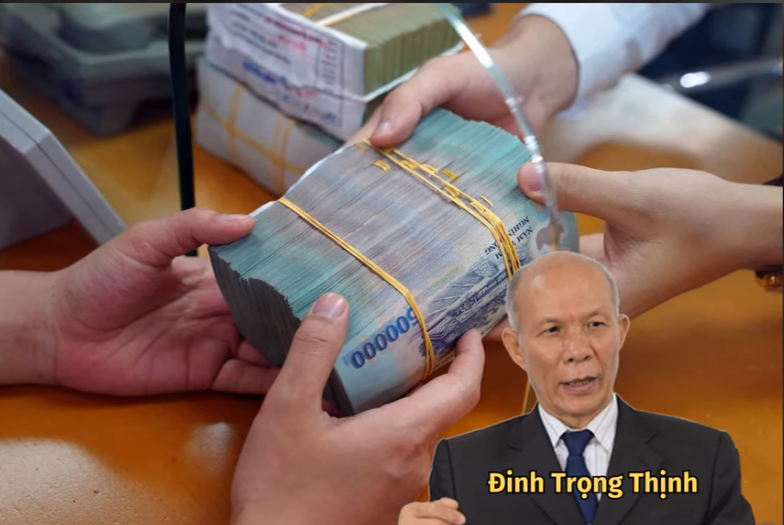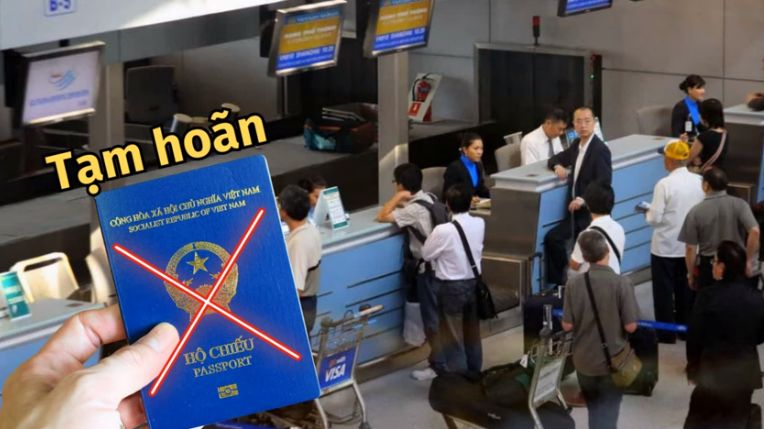Recent incidents
In the past month, the customs departments under the Ho Chi Minh City Customs Department have issued temporary exit suspension decisions for 12 individuals who are legal representatives of companies due to tax debts. Notably, the temporary exit suspension is applied to cases with significant tax debt amounts, regardless of the severity. A typical example is Mr. Lê Huy Bình, the legal representative director of Khải Đăng Chemical Trading Limited Liability Company. The Saigon Port Customs Department, Area 4, has sent a notification to the Immigration Department of the Ministry of Public Security regarding the temporary exit suspension for Mr. Bình due to his company’s failure to fulfill tax obligations amounting to 977.2 million VND.
Similarly, Mr. Nguyễn Hữu Huynh, the director and legal representative of An Thái Food Technology Limited Liability Company, was also temporarily suspended from exiting due to his company’s tax debt of nearly 290 million VND. The case of Mr. Trần Tô Quyền, the director and legal representative of Ngọc Diệu Commercial Construction Service Limited Liability Company, was also suspended from exiting due to being enforced for over 10.2 million VND in tax. Not only in Ho Chi Minh City, the tax department in Biên Hòa, Vĩnh Cửu under the Đồng Nai Provincial Tax Department has also sent a notification requesting the Immigration Department of the Ministry of Public Security to temporarily suspend the exit of 64 individuals who are legal representatives of tax-debted companies. Previously, in October 2023, the tax department in District 7, Nhà Bè, under the Ho Chi Minh City Tax Department also requested the competent authority to prohibit the exit of 11 individuals who are legal representatives of 11 tax-debted companies.

In addition, there are cases where many people only find out about their temporary exit suspension due to tax debts when they arrive at the airport. For example, in October 2013, Ms. LTV, the legal representative of Baby Care Trading Limited Liability Company in District 1, Ho Chi Minh City, submitted a petition to the Saigon Port Customs Department, Area 1, regarding the exit suspension notifications while she had never been a director and was unaware of the Baby Care company. She asserted that her information was stolen to establish the company for the malicious purpose of tax evasion and requested the business registration licensing authority to cooperate in providing the Baby Care company’s documents to the police for verification. The forgery of the business registration certificate of this company was also mentioned. At the same time, she requested the cancellation of the temporary exit suspension notification against her.
According to Mr. Nguyễn Tiến Dũng, Deputy Director of the Ho Chi Minh City Tax Department, the law allows the tax sector to send notifications requesting the Immigration Department to temporarily suspend the exit of individuals violating tax laws. Mr. Dũng also confirmed that after these individuals fully pay their taxes, the tax authority will notify the Immigration Department to lift the exit suspension.
Are there other measures?
Although the temporary exit suspension is applied to tax-debted companies, the reality shows a significant difference in the amount of tax debt among cases, with some companies owing tax amounts up to tens of billions of VND while others owe only a few hundred thousand VND. A typical case is that of the director and legal representative of Gia Thăng Chemical Trading Limited Liability Company, who was proposed for temporary exit suspension due to this company’s tax debt of over 997 million VND, excluding late payment penalties.
From the perspective of businesses, the ultimate goal of applying sanctions against tax-debted companies is to recover the owed amounts for the state budget. Therefore, the measure of freezing the company’s bank account should be prioritized. A business director in District 7 shared that in 2023, he received a notification from the District 7 tax department regarding his company’s value-added tax debt of about 10 million VND, and the tax authority required the company to pay the tax within 5 days from the date of notification. If not, they would apply sanctions, including requesting a temporary exit suspension. This director stated that the company’s accountant had completed the tax report but forgot to pay the tax.

As soon as we received the notification, we immediately paid the tax and the fine, he also expressed his view that we did not intentionally evade taxes but due to the oversight of the specialized department and rectified it immediately after receiving the tax authority’s notification. However, through this incident, I realize that the tax authority could choose other ways to recover tax debts and support businesses more effectively. For example, instead of the notification period to the decision being only 5 days, which is too short, businesses should be given 30 days to check and fulfill their tax obligations. This 30-day period is also sufficient for businesses facing financial difficulties to manage and pay taxes. This businessman also added that in cases where a business is temporarily suspended from exiting due to oversight, the process of lifting the exit suspension decision will take a lot of time and procedures.
More importantly, the temporary exit suspension decision will become a black mark in the records of the businessman and the business. According to a tax inspector from the Ho Chi Minh City Tax Department, the exit suspension of the legal representative of a business due to tax debts is the result of a prolonged process over many months. The reason is that besides units intentionally evading taxes, there are many businesses facing difficulties in business leading to tax debts. In these cases, the tax authority always notifies and works with the business, listening to their proposals and commitments regarding tax payment within a certain period.
Only when the business fails to fulfill its commitments does the tax authority proceed with tax enforcement. Initial tax enforcement measures include freezing bank accounts and notifying that invoices are no longer valid. If the business still does not pay taxes after these measures are applied, the tax authority is forced to apply many other measures, including requesting an exit ban for the legal representative, as the tax authority is the unit responsible before the law for the business owner being banned from exiting.
Regarding the issue of businesses owing only a few million VND in taxes also being banned from exiting, the tax inspector stated that one of the important tasks of the tax sector is to focus on recovering tax debts to ensure revenue for the state budget. Therefore, the tax authority must apply enforcement measures to ensure that businesses are responsible for fulfilling their budget obligations. If not implemented, superiors will question why the tax authority does not enforce legal regulations. However, the tax inspector also believes that the flexible exit ban for tax-debted businesses needs state policy and legal adjustments regarding taxes.
Tax debts, even one dong is a violation
Lawyer Nguyễn Quốc Toản, director of IAM Law Firm in Ho Chi Minh City, affirmed that tax debts, even just one dong, are a violation of the law. Individuals and businesses related to overdue tax debts must be treated equally according to legal regulations. Taxes do not distinguish between rich and poor; there is no such thing as owing little or owing much, only overdue debts, which means a violation. Lawyer Toản cited the story of an American man who, due to a house tax of 500 dollars that he paid but forgot about the accumulated interest of 8.41 dollars during the payment review period, ended up having his house worth 60,000 dollars seized three years later. Lawyer Toản emphasized that owing more than 8 dollars can also lead to asset seizure.
The principle of American law is that failing to pay enough taxes in the previous year will be considered tax debt for the asset owner. Applied to businesses, a tax debt of nearly 1 million VND, lawyer Toản believes that this amount may seem small at first, but if including the overdue interest over the past 11 years, the debt amount will certainly not stop at 1 million VND. According to Associate Professor Dr. Đinh Trọng Thịnh, Academy of Finance, a financial economic expert, taxes are the highest legal regulations that contribute to the state budget, which every individual and business with revenue and profit must pay. In principle, businesses and their legal representatives must calculate, declare, and comply with tax payment obligations.

Associate Professor Dr. Thịnh explained that simply put, the temporary exit suspension or customs enforcement decisions related to tax debts aim to ensure the rule of law for businesses and entrepreneurs who have established businesses and are legal representatives of those businesses, placing the rule of law as a top priority. The tax debt notifications and enforcement measures are sent many times to the businesses during that time. The legal representative of the unit cannot be unaware or think that a small amount is not worth paying attention to. I believe there should be no distinction or leniency for cases of overdue tax debts like this.
Who is responsible for the delay in tax refunds?
In the context of the tax sector tightening and the handling of tax debts, many businesses believe that the tax authority should also be held accountable for delays in tax refunds. Recently, the Vietnam Rubber Investment Limited Liability Company reported that it has been delayed in tax refunds for nearly 2 years, amounting to nearly 70 billion VND. In fact, the delayed tax refund amount is currently larger than the company’s charter capital, forcing the business to temporarily cease operations due to lack of capital for circulation. The company representative stated that although facing many difficulties, the business cannot dissolve because if it dissolves, the procedures to receive tax refunds later will become increasingly difficult. Being temporarily held for tens of billions of VND in value-added tax has caused the business to lose financial resources, making it unable to fulfill export orders and continuously lose customers.
